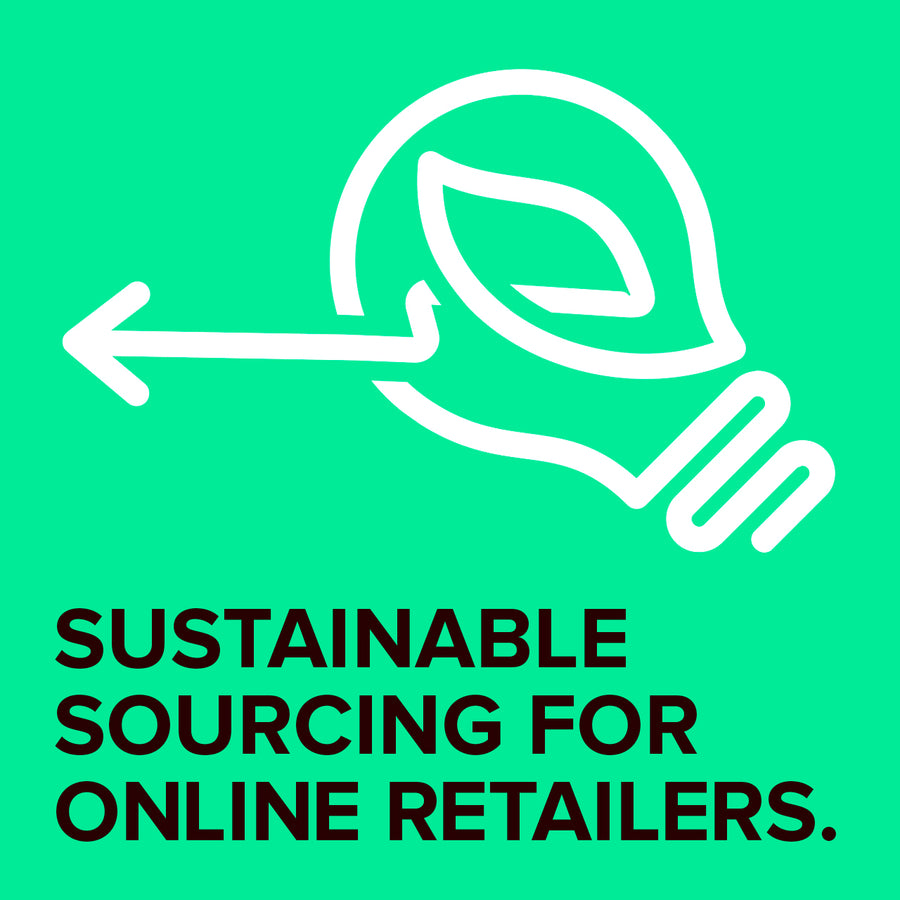Sustainable Sourcing for Online Retailers
26 April 2024

Want to make your online shop more eco-friendly? Sustainable sourcing is the answer. Learn how to find ethical suppliers, switch to eco-friendly packaging, optimise deliveries, and build a brand that customers feel good about supporting.
In today's world of click-and-buy convenience, the eCommerce boom is undeniable. However, as online shopping becomes the norm, it's crucial for retailers to consider the environmental impact of their operations. Sustainable sourcing offers a responsible approach to selecting materials and suppliers, minimising the burden on our planet's resources.
The fashion industry serves as a sobering example of unsustainable practices. From intensive water use in cotton production to textile waste and pollution, this sector has a significant environmental footprint. As consumers grow more eco-conscious, online retailers have the opportunity, and the responsibility, to shift towards more sustainable sourcing strategies.
The Challenges of Sustainable Sourcing for Online Retailers
While sustainable sourcing offers clear advantages, online retailers face some unique challenges in its implementation. Two of the most pressing issues are packaging waste and delivery emissions.
Packaging Waste
The sheer volume of packaging used in eCommerce is staggering. From cardboard boxes and plastic fillers to excess wrapping, this waste creates a major environmental burden. Sadly, much of this packaging ends up in landfills or our oceans, harming ecosystems, and wildlife.
Solutions for Retailers and Consumers
Eco-friendly packaging: Explore biodegradable, compostable, or recycled materials.
Right-sizing: Use boxes appropriate to the product size to reduce wasted space.
Reusable options: Consider innovative reusable packaging schemes.
Standard shipping: Opting for standard shipping often means less packaging compared to express options.
Delivery Emissions
The transportation of goods leaves a significant carbon footprint. From fuel consumption to air freight, the process of getting products to customers contributes to greenhouse gas emissions.
Solutions for Retailers and Consumers
Delivery route optimisation: Use technology to plan the most fuel-efficient routes.
Electric vehicles: Invest in electric or hybrid delivery vehicles, where feasible.
Consolidated shipments: Limit the number of individual deliveries for a single order.
Standard shipping: Choose slower, but often more eco-friendly shipping options.
Group orders: Combine purchases with friends or neighbours to reduce delivery trips.
It's important to acknowledge that tackling these challenges may come with initial costs or logistical adjustments. However, the long-term benefits to the environment and your brand reputation make these efforts worthwhile.
How to Implement Sustainable Sourcing in Your Online Retail Business
Ready to make your eCommerce business more eco-conscious? Here are actionable steps to start integrating sustainable sourcing:
- Partner with Sustainable Suppliers: Seek out suppliers committed to ethical and environmentally responsible practices. Research their credentials, certifications (like Fairtrade or organic), and materials sourcing. Online directories specialising in sustainable businesses can be a great resource.
- Use Recycled Materials in Packaging: Switch to packaging made from recycled cardboard or paper. Explore compostable or biodegradable options for fillers and mailers.
- Reduce Packaging Waste: Minimise excess packaging, eliminate unnecessary layers, and right-size your boxes to match product dimensions.
- Optimise Delivery Routes: Invest in route optimisation software to plan the most efficient delivery paths for your drivers, minimising fuel consumption and emissions.
- Offer Eco-friendly Shipping Options: Give customers the choice of slower, consolidated, or "greener" delivery methods at checkout. Partner with carriers that prioritise sustainability.
- Be Transparent About Your Sustainability Efforts: Clearly communicate your commitment to sustainability on your website and marketing materials. Highlight your eco-friendly sourcing, packaging choices, and any relevant certifications. This transparency builds trust and resonates with conscious consumers.
Remember, progress over perfection! It may take time to fully overhaul your sourcing processes. Start by implementing a few changes and gradually work towards a more comprehensive sustainable strategy.
Conclusion
Sustainable sourcing is no longer just a nice-to-have for online retailers – it's becoming an expectation. Consumers increasingly favour businesses that align with their values, and environmental responsibility is a key factor. By embracing sustainable practices, eCommerce businesses not only lessen their environmental impact but also strengthen their brand reputation and customer loyalty.
The challenges associated with sustainable sourcing are real, but the potential benefits far outweigh them. If you haven't already begun incorporating sustainable sourcing into your business model, now is the time to start. Even small changes can make a significant difference over time. Let's collectively strive towards an eCommerce industry that's both thriving and in harmony with our planet.
Ready to take your online retail business to the next level of sustainability?
The team at Absolute Design is here to help. As winners of the Best Sustainability Initiative at the 2023 eCommerce Awards, we have the expertise and passion to assist you in implementing sustainable practices throughout your eCommerce operations.
We collaborate with a network of eco-conscious businesses and tech partners, ensuring you have access to the best sustainable solutions on the market. Contact us today to discover how to make your business a force for environmental good.
Contact Us to discuss how we can help increase sales and boost your online performance!
INSIGHTS
CASE STUDIES

Fired Earth - Shopify Plus
Fired Earth’s move to Shopify Plus marked a major transformation for their B2C and B2B operations, streamlining their product catalogue and delivering a faster, more adaptable eCommerce experience, supporting growth and enhanced customer engagement.
-
Shopify

Carluccio's Coffee Subscription
Discover how we helped Carluccio’s transform their online coffee products, creating a bespoke design, unique user journey and efficient user experience, resulting in an eye-catching subscription service, seamlessly integrated with their Shopify site.
-
Shopify
CONTACT
Are you excited to get your next project up and running? Or are you unsure what is dragging you down?
Contact Us to discuss how we can help increase sales and boost your online performance!

Enter your email address to sign up to our newsletter, featuring case studies, insights, industry news and much more.
If this is something you would like help with, please get in touch.






